The 2025 Nyingchi Peach Blossom Festival will begin on April 3 and last for a month. During the festival, the sea of pink peach flowers stretches from the virgin forest to the mountains. This 8 days tour will take you to the different sites in Nyingchi to admire the beauty of peach flowers as well as forest, glacier and lakes fully. Starting from Nyingchi, you can extend your nature tour to the holy city Lhasa, and you will have a good time in appreciating the Buddhist culture and great Tibetan architectures.
Highlights of this tour:
- Enjoy the beauty of peach blossoms in Nyingchi and immerse yourselves in the happy atmosphere of festival with local Tibetans;
- Admire the natural wonders in Nyingchi, like Midui Glacier, Ranwu Lake, and Basum Tso Lake etc.
- Climb up the grandiose Potala Palace and visit sacred Buddhist temples and monasteries in Lhasa, such as Jokhang Temple, Drepung Monastery.
Tour Brief Information
- Tour price: from
- Tour code: TD-NLT-08B
- Tour Type: Private Customizable Tour Package
- Destination: Bayi / Bomi / Ranwu / Bayi / Lhasa
- Duration: 8 days and 7 nights
- Departure: Flexible
- Travel Theme:



- Best Time:

- Physical Level
- Tour Pace
- Max Altitude
4,720m
- Itinerary Details
- Included Services & Fees
- Reviews
- Gallery
- Make an Enquiry
Your tour - at a glance
Day 1~4 Nyingchi Arrival & Tour
Day 5 Nyingchi to Lhasa
Day 6~7 Lhasa City Tour
Day 8 Lhasa Departure
Itinerary Details - Day by Day
Day 1 Nyingchi Arrival
Nyingchi Airport Pick UpWelcome to Nyingchi, the “Switzerland of Tibet”. You will be met by your tour guide at the hall of Milin Airport, then be escorted to your hotel in Bayi Town. In the 1 hour's driving journey, you will be welcomed by the brilliant peach blossoms along road. The rest of today is free for you to acclimatize the altitude and explore surroundings.
Accommodate at Bayi Town and have a good rest.
-
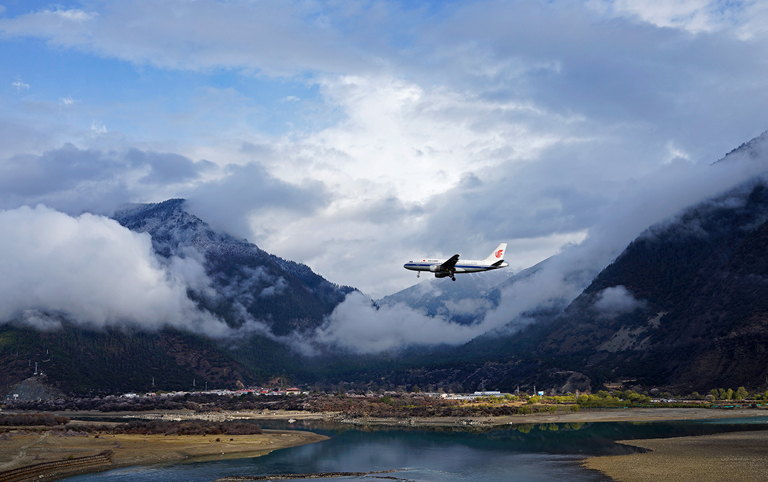 Airplane to Beautiful Nyingchi
Airplane to Beautiful Nyingchi
Day 2 Nyingchi – Bomi (B)
Today's Highlights: Gala Village, Mt. Namjia Bawa, Lulang ForestToday, you are going to drive to Bomi, about 230km away from Bayi Town. The wonderful sightseeing activities come on the road.
Firstly, you will drive about 1.5km out of town to visit the most famous and magical tree in Nyingchi – the King Cypress which is 50 meters tall but more than 2,500 years old. Leave the King Cypress, you will move to the highlight of today – Gala Village, a typical peach village where the opening ceremonies of several seasons of Nyingchi Peach Blossom Festival were held. In the valley of Gala Village, you can see the peach flowers burst into bloom. Combining with the green crops and mountains, these flowers will undoubtedly make you hooked.
On your way to Lulang Forest, take a short stop at Sekyim la Pass and enjoy a distance view of Mt. Namjia Bawa. Then, continue your trip to Lulang Forest, a 15km long and 1km wide narrow valley of wild forests and flowers, grasslands and streams. Lulang, in Tibetan, means “Dragon Valley” or “the place where you won’t be homesick”. On the both sides of the valley are lofty green mountains covered by prosperous spruce, pine trees and brush. At the foot of the mountain are the beautiful meadows and villages. Winding streams flow through among the wooden houses. Wild flowers of different colors dot on the meadows. Look into distance over the valley are enormous snow-capped mountains. All these sceneries make Lulang a dream land.
After the sightseeing on Lulang Forest, you will turn to Bomi and pay a happy visit to Peach Blossom Village, another popular site for the peach flowers. Blessed by the Yarlung Zangbo River, the peach flowers grown in this village are in bigger size and exceptionally brilliant. In additon to the stunning flowers, you won't miss the majestic snow peaks there. It seems that the flowery spring is huged by the snowy winter.
Accommodate at Bomi.
-
 The Peach Blossom Village in Bomi
The Peach Blossom Village in Bomi
-
 Tibetan People in Gala Peach Blossom Village
Tibetan People in Gala Peach Blossom Village
-
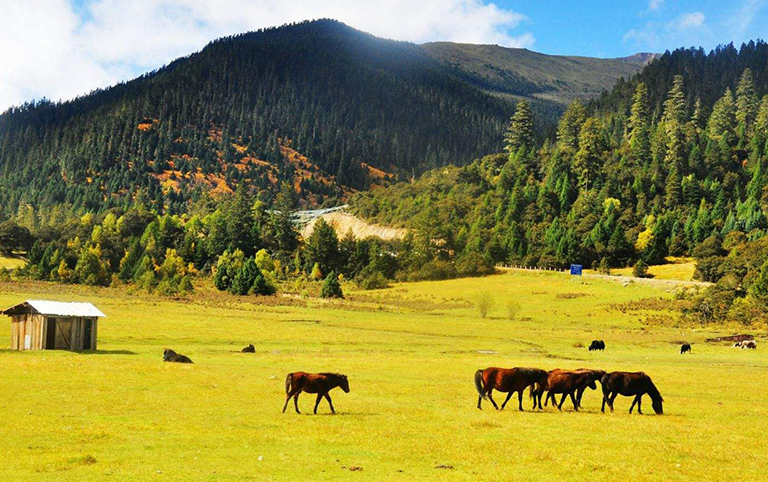 Feel the beauty of Lulang Forest
Feel the beauty of Lulang Forest
Day 3 Bomi - Midui Glacier – Ranwu Lake (B)
Today's Highlights: Midui Glacier, Ranwu LakeToday, you will enjoy a fabulous feast of landscape. After breakfast, drive about 100km, you will arrive at the famous Midui Glacier. Ranked by China National Geography as one of the top six most beautiful glaciers in China, the Midui Glacier is featured in different shapes and forms of glaciers, including two about 800 meters high ice falls. At the foot of the glacier are green wild forests. Further down the forests are peaceful Tibetan villages, farmlands and ice lakes.
Leave Midui, and move to next also the final stop of today – Ranwu Lake. It is a barrier lake formed by landslides and debris flows of around 200 years ago. The lake is tranquil and clean. But the best feature is its reflections of surrounding diverse landscapes of grasslands, forests, blue sky and snow mountains like a mirror, which changes colors in different seasons.
Accommodate near the Ranwu.
-
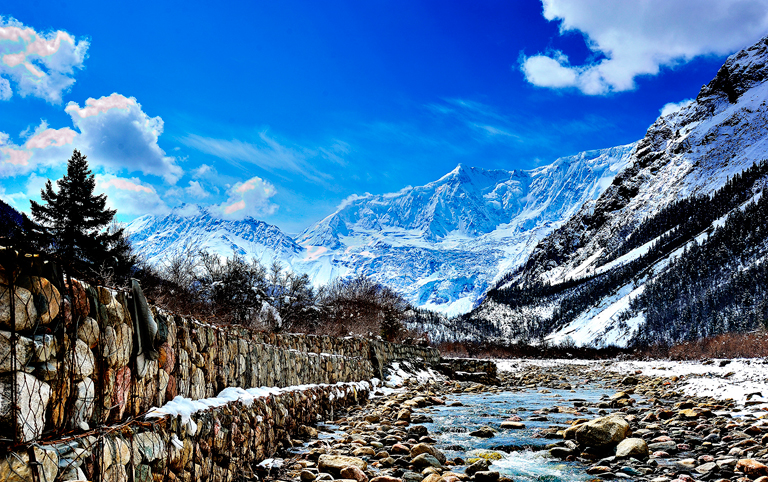 Midui Glacier shows biological diversification
Midui Glacier shows biological diversification
-
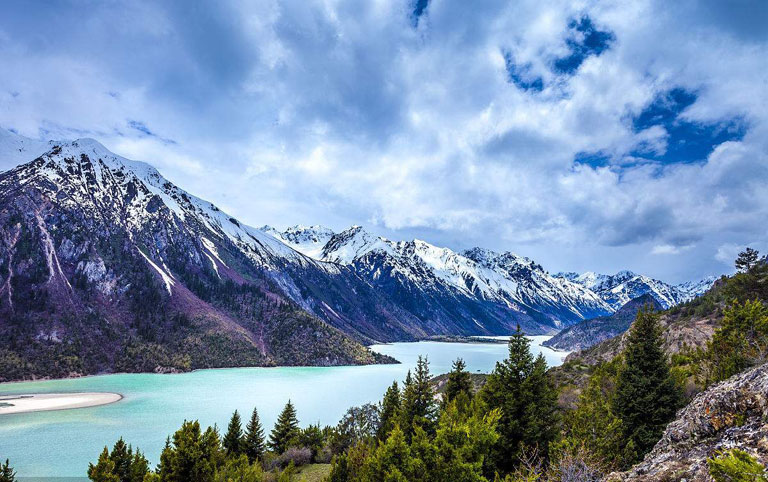 Ranwu Lake Surrounded by Snow-capped Peaks and Forests
Ranwu Lake Surrounded by Snow-capped Peaks and Forests
Day 4 Ranwu Lake – Nyingchi (B)
Today's Highlights: Ranwu Lake Sunrise, Scenic 318 National RoadGet up early to witness the amazing sunrise at Rawu Lake. Wispy mists float above the lake, while the morning sunlight shines on the snow mountains, which looks like a golden pyramid. Enjoy the fresh air and let your camera record the wonderful landscape.
Then you will move back to Nyingchi in the rest of today along the 318 National Road. It may take about 8~9 hours to get to Bayi Town, but you don’t have to worry being bored by the long distance. Because you will drive on the most beautiful parts of the 318 Road which starts from Rawu to Bayi. Feel free to ask for your driver for stop on the way for the scenery.
Accommodate at Bayi Town.
-
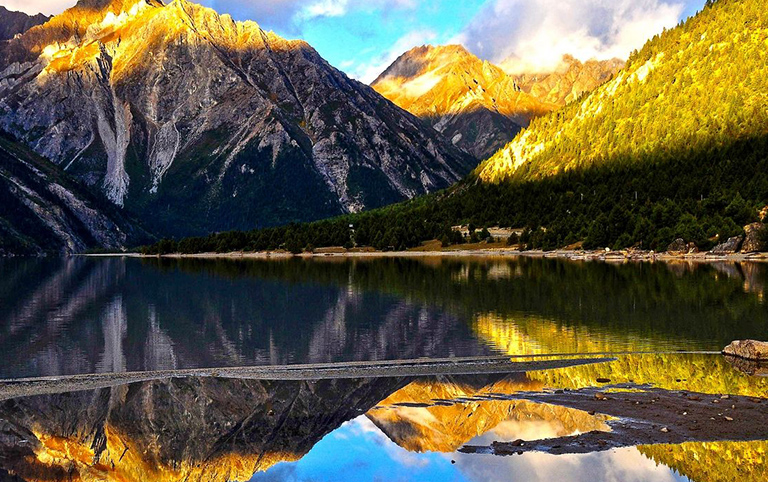 Splendid Sunrise in Ranwu Lake
Splendid Sunrise in Ranwu Lake
Day 5 Nyingchi – Lhasa (B)
Today's Highlights: Basum-tso Lake, Nyyang RiverToday, we will drive to the holy City Lhasa. The whole journey takes about 7 hours’ driving. On route, you will take a sidetrip to visit Basum-tso Lake. Basum-tso Lake, 3,500 meters above sea level, originates from Nyching Tangha Mountain and is a dozen kilometers long. Snow-covered mountains, glaciers and trees are reflected upon the lake’s rippling surface. There are small islands in the middle of the lake with Buddhist temples built upon them.
After the sightseeing in Basum-tso Lake, you will drive to Lhasa alongside the picturesque Niyang River, the longest tributary of the Yarlung Tsangpo River. There are some peach flowers for your sightseeing as well. When you pass through Gongbo Gyamada county (in upper reach of Niyang River), you can also enjoye the clustering peach blossoms along the National Highway 318.
Arrive in Lhasa and take a good rest in the hotel.
-
 Peach Blossom Trees along the Niyang River
Peach Blossom Trees along the Niyang River
-
 Meet with rainbow after rain in Basum-tso
Meet with rainbow after rain in Basum-tso
-
 Beautiful Basum-tso Lake
Beautiful Basum-tso Lake
Day 6 Lhasa City Tour (B)
Today's Highlights: Norbulingka, Drepung Monastery, Sera MonasteryToday you will visit popular attractions in Lhasa city and suburb to explore Tibetan culture. You will firstly go to visit the beautiful Norbulingka which used to be the former summer palace of Dalai Lamas in the ancient time, and now is a public park. Dotted with various kinds of precious flowers and plants, it is the genuine "Plateau Oxygen Bar". In addition to its magnificent buildings and colorful flowers, Norbulingka also features some big Tibet event activities during big festivals, like Tibetan shows in annual Shoton Festival. Next, drive several kilometers to the western outskirts of Lhasa to visit Drepung Monastery. Drepung, in Tibetan, means "prosperity". Since its establishment, Drepung Monastery has always been one of the most important Buddhist monasteries in Tibet. In its heyday, there were more than 10,000 monks lived and studied in the monastery. Throughout its history, many important and famous Tibetan leaders used to study here, especially the Dalai Lamas. So Drepung Monastery is also respectfully known as the "Mother School of Dalai Lamas". You can also enjoy a panoramic view of Lhasa from Drepung Monastery.
In the afternoon, you will be taken to another famous monastery in Lhasa - Sera Monastery. It is famous for the spectacular "Buddhism Debating". As a daily routine, the monks gather in a courtyard, and debate on the Buddhist doctrines with supplemented gestures, which is thought to be helpful to facilitates better comprehension of the Buddhist philosophy to attain higher levels of study. After enjoying the "Buddhism Debating", you will be transferred back to the city. The rest time is your own free time to rest.
The Etiquette of Visiting Monastery: 1) you shouldn't wear short and uncover shoulders; 2) taking off your sunglasses and hat before entering the chapels; 3) taking photos is usually not allowed inside the chapels.
-
 Buddhism Debating Scripture with dramatic gestures in Sera Monastery
Buddhism Debating Scripture with dramatic gestures in Sera Monastery
-
 First Sight of Drepung Monastery
First Sight of Drepung Monastery
-
 Norbulingka Park is a good summer resort in Lhasa
Norbulingka Park is a good summer resort in Lhasa
Day 7 Lhasa Potala Palace (B)
Today's Highlights: Potala Palace, Jokhang Temple, Barkhor StreetStart today's Lhasa exploration with an exciting visit to the landmark - Potala Palace which is the home to the successive Dalai Lama as well as a great masterpiece of Tibetan architecture. The whole palace is divided into the White Palace - living quarters and office to deal with political and Buddhist affairs for Dalai Lamas, and the Red Palace where houses several stupas of previous Dalai Lamas, many historical relics and precious arts. After entering the gate of Potala Palace, you need to walk up about 30 minutes along the zigzag stone paths with white-and-red walls to the White Palace. Remember to ascend the steps slowly and take some stops for sightseeing and rest which will be helpful to reduce high altitude sickness. Then explore the palace in an orderly way from the White Palace to the Red Palace, and exit from the back side. After Potala Palace visit, go to enjoy a leisure stroll in Zongjiao Lukang Park, a lovely park with pleasant scenery built around the lake behind Potala Palace. It is a great place to experience local Tibetans' living styles as you can see local people gathering and chatting, taking exercise, walking the kora, feeding wild birds and ducks, etc. If your day is clear, you can take some great photos of the reflection of Potala Palace on the lake in the park.
Continuing your exploration, you will then get to Jokhang Temple which is considered as the spiritual center of Lhasa and the most revered religious structure of Tibet. In front of Jokhang Temple, you can see crowds of pilgrims polishing the flagstones with their prostration, which is truly a heart-touching scene you will ever see. This temple is also known as the "house of Buddha" because it keeps the precious Jowo Rinpoche, the life-sized (5 foot/1.5m) image of the Shakyamuni at the age of 12. Rise to the top floor of this temple, you can see savor the beautiful golden roof and the view of Potala Palace afar. The last site for today’s exploration is the famous Barkhor Street. It is a circular and wide street encircling the Jokhang Temple. The local people like to walk on the street for several circles usually in the late afternoon as a daily tradition of pilgrimage. The street also has many shops selling a wide variety of traditional Tibetan goods, religious items and handcrafts.
Optional Activity: If your physical strength permits, take a short climb to the viewing-deck of Chakpori Hill to take a panoramic photo of Potala Palace after your Potala Palace visit.
Tips of today: 1) taking photos is not allowed inside the palace; 2) today you will be mainly outside, please bring some water, a hat, sun cream, and sun glasses with you.
-
 The Reverse Side of Potala Palace and Surrounded Peach Flowers
The Reverse Side of Potala Palace and Surrounded Peach Flowers
-
 Tibetan and tourists enjoy the sunshine in the Jokhang Temple Square
Tibetan and tourists enjoy the sunshine in the Jokhang Temple Square
-
 Local House by Barkhor Street
Local House by Barkhor Street
Day 8 Lhasa Departure (B)
Lhasa Airport or Train Station Dropped OffToday is free for you until your tour guide transfer you to the airport in time for your flight or drop you off at Lhasa train station.
Tips of today: 1) please pack your luggage carefully, especially for small things like camera charger, power adaptor, mobile phone, phone charger, wallet and towel; 2) if your flight is arranged in the afternoon, please make sure you check out the hotel before 12pm.
Useful Trip Notes
- 1. Tibet Permits Guaranteed
To travel in Tibet, all Non-Chinese passport holders need to have a Tibet Travel Permit which is issued by Tibet Tourism Bureau in Lhasa. And only Chinese travel agencies like Tibet Discovery can apply for the permit on behalf of tourists. You must obtain it before your tour starting because the permit will be checked when you board your flight/train to Tibet. Traveling with Tibet Discovery, you don't have to worry about the complicated procedures of Tibet Travel Permit application. All you have to do is to confirm a tour package with us and send us your passport and Chinese visa copies at least 15~20 days in advance before your tour, then we will take care of all the rest things. Once the permit is issued, we will deliver to your address in China, such as your hotel, local travel agency, etc. - 2. Available Months to Visit Tibet
Nyingchi Peach Festival usually starts from the middle or late March to the late April. In the early April, you are able to enjoy the most beautiful flowers in full blossom. From April, the temperature rises gradually, and it is available to extend your tour to Lhasa, Gyantse, Shigatse and Everest. Except the peach blossoms in Nyingchi, there is also other natural landscape, like snow peaks, mirror-like lakes, luxury forests etc. - 3. High Altitude Sickness
The average altitude of Nyingchi is only about 3,000m, really low compared with some other regions in Tibet. There is no need to worry too much about High Altitude Sickness. You may still suffer a bit from High Altitude Sickness in the beginning days of your Tibet trip if you haven’t had rich high plateau travel experience, but the high altitude can be acclimatized usually in 2~3 days. Our suggestion is to take a physical examination and get suggestions from your doctor, and also bring some medicines to prevent from High Altitude Sickness before your trip. While in Tibet, you should keep warm all the time, avoid strenuous activities, drink more water and eat more vegetables and carbohydrates. You’d better not take showers during the first two days after your arrival at Tibet. If you don’t feel well, get help from your tour guide or go to the hospital without any delay. - 4. How to Get to Nyingchi
Taking flight is the fastest and most comfortable transportation to get to Nyingchi. At present, Nyingchi Maining Airport provides flights to/from Chengdu (2hrs), Chongqing (2hrs 40mins), Xian (3hrs) and Lhasa (1hr). Chengdu is always regarded as the most popular city to Nyingchi in that it has more frequent flights with shorter flying duration. Moreover, Chengdu itself is a worth-visiting city famous for Giant Panda and slow lifestyle.
If you want to get to Lhasa first, and then transfer to Nying, both driving (about 6 hrs) and flights are available. - 5. Packing and Wearing Ideas
Firstly you can’t forget your documents – passport, Chinese Visa, Tibet Travel Permit, etc. A large backpack and a smaller one are recommended (the smaller one can be used for daily activities). Also bring the necessary medicine you need. Other stuffs like sunglasses, snow glasses, hats, lip balm, sun block are recommended.
As for wearing, you are suggested to dress in layers (both thin and thick jackets). Down jacket is necessary in Spring and Autumn. A pair of durable and comfortable shoes is necessary.
Recommended Tibet Group Tour Packages
Escorted by a skilled driver and companied by a professional local tour guide to organize all the activities, all you have to do is to enjoy your fantastic Tibet journey.Following are some other recommended Tibet group tour packages that you may be interested in. You can also contact us to customize a trip if you want..
-

Lhasa / Nyingchi / Lhasa
7 Days Classic Lhasa Nyingchi Discovery Tour
Highlights: Basomtso Lake, Lulang Forest, Ganden Monastery
-
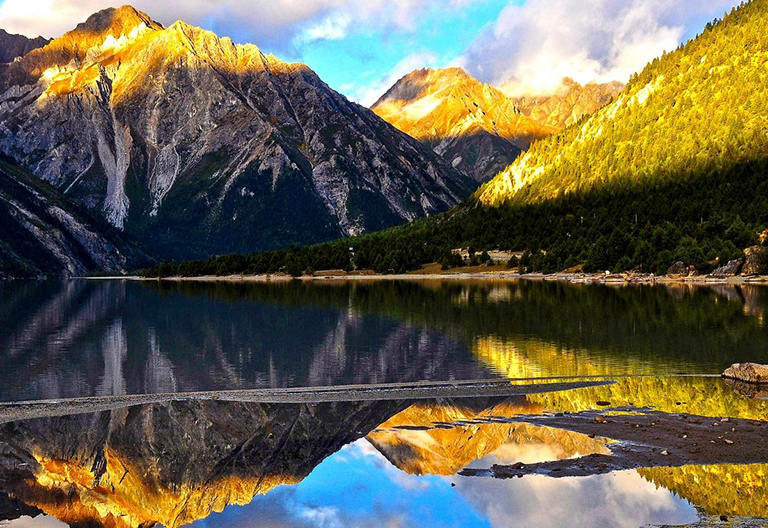
Bayi / Bomi / Rawo / Bayi / Lhasa
8 Days Tibet Dream Tour from Nyingchi to Lhasa
Highlights: Rawo Lake, Midui Glacier, Basum Tso Lake, Potala Palace
-
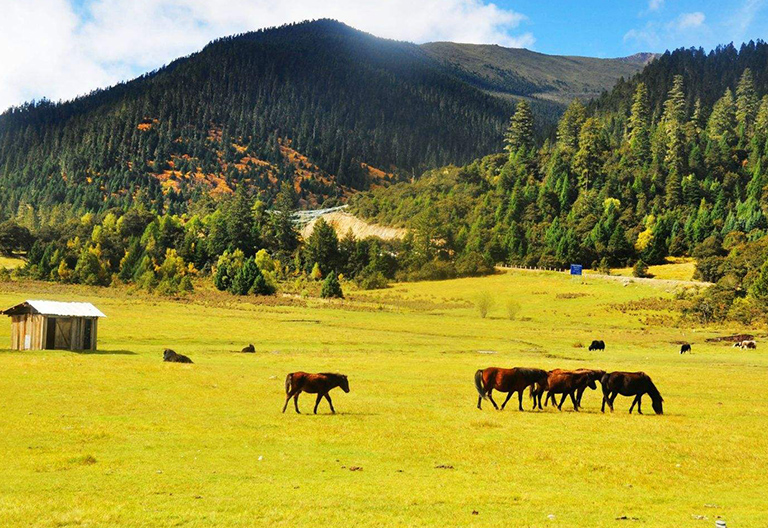
Lhasa / Nyingchi
7 Days Tibet "Switzerland Views" Tour (Lhasa - Nyingchi)
Highlights: Potala Palace, Basomtso Lake, Lulang Forest
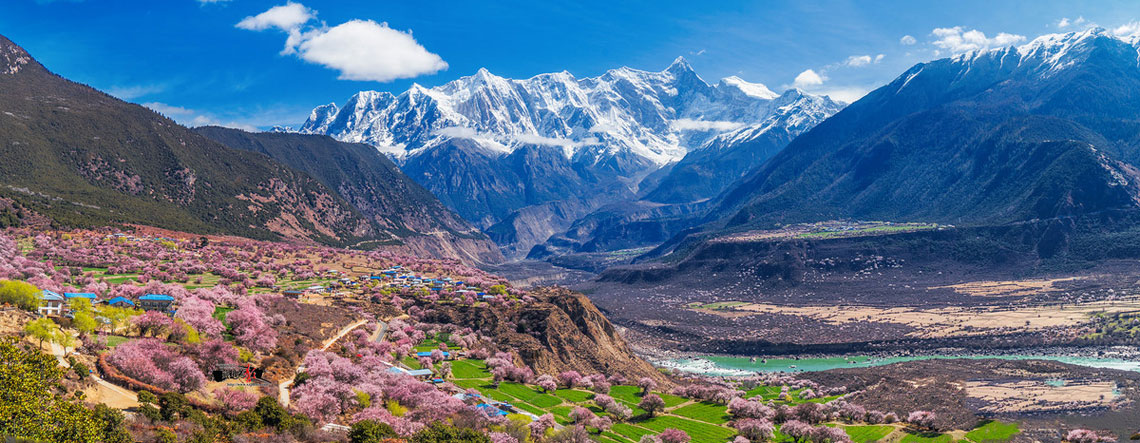
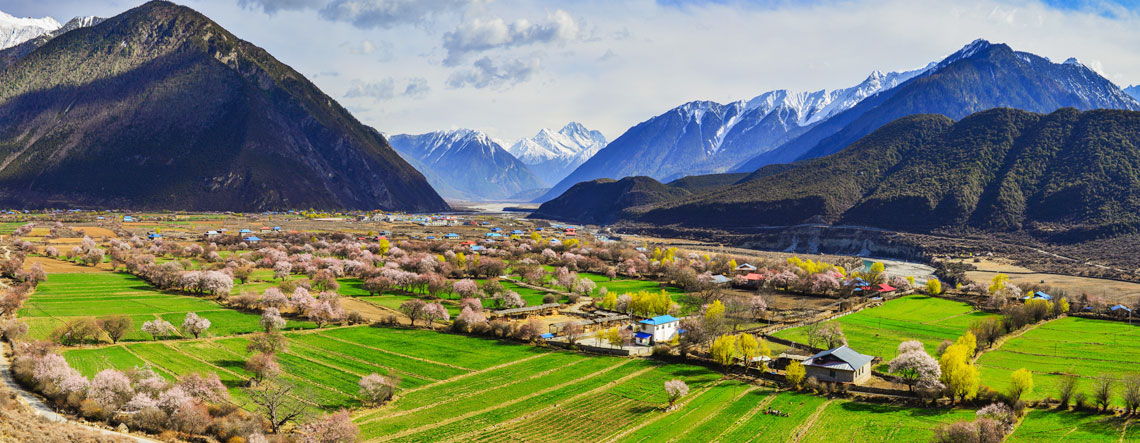
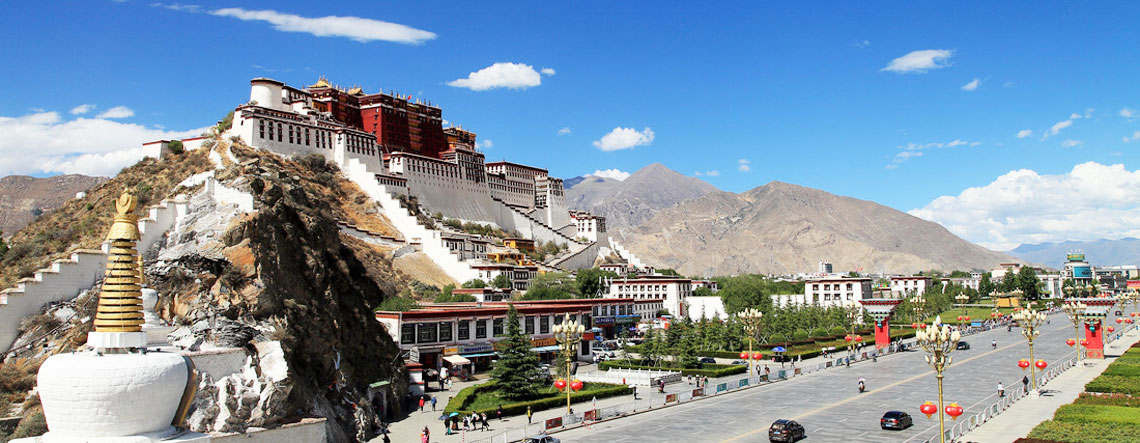


 Karen
Karen Wonder
Wonder Jack
Jack Rita
Rita Johnson
Johnson Vivien
Vivien Wing
Wing Ariel
Ariel Leo
Leo Tracy
Tracy Evelyn
Evelyn April
April Phoebe
Phoebe Kelly
Kelly Shirley
Shirley Reya
Reya Juliet
Juliet Elk
Elk Karina
Karina Tammy
Tammy Felix
Felix Sean
Sean